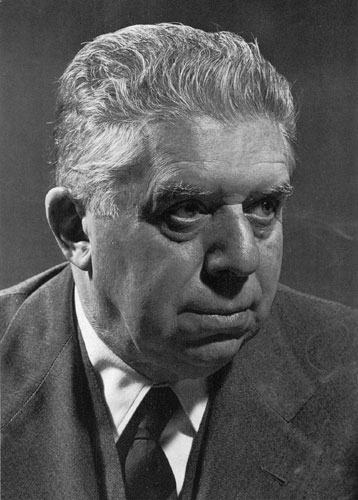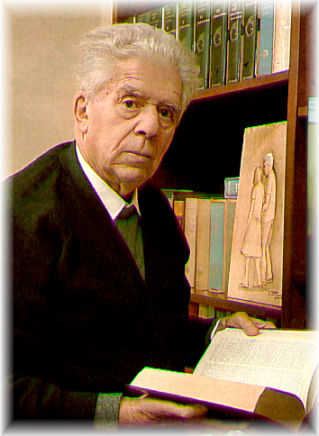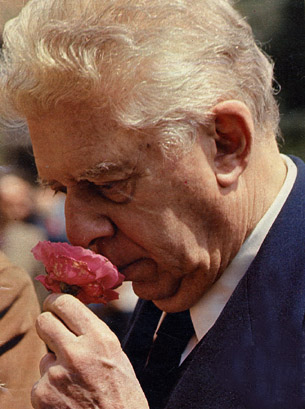<Back to Index>
- Biochemist Arthur Harden, 1865
- Poet Eugenio Montale, 1896
- King of England and Ireland Edward VI, 1537



Eugenio Montale (October 12, 1896 — September 12, 1981) was an Italian poet, prose writer, editor and translator, winner of the Nobel Prize for Literature in 1975.
Montale was born in Genoa. His family were chemical products traders (his father furnished Italo Svevo's firm). The poet's niece, Bianca Montale, in her Cronaca famigliare ("Family Chronicle") of 1986 portrays the family's common characteristics as "nervous fragility, shyness, concision in speaking, a tendency to see the worst in every event, a certain sense of humour". Montale was the youngest of six sons. He recalled,
We were a large family. My brothers went to the scagno ("office" in Genoese). My only sister had a university education, but I had not such a possibility. In many families the unspoken arrangement existed that the youngest was released from the task to keep up the family's name.
In 1915 Montale worked as an accountant, but was left free to follow his literary passion, frequenting the city's libraries and attending his sister Marianna's private philosophy lessons. He also studied opera singing with the baritone Ernesto Sivori. Montale was therefore a self-taught man. Growing up, his imagination was fired by several writers, including Dante Alighieri, and by studies of foreign languages (especially English), as well as the landscapes of the Levante ("Eastern") Liguria, where he spent holidays with his family.
During World War I, as a member of the Military Academy of Parma, Montale asked to be sent to the front. After a brief war experience as an infantry officer in Vallarsa and Val Pusteria, in 1920 he came back home. Montale wrote a relatively small number of works. Four anthologies of short lyrics, a quaderno of
poetry translation, plus several books of prose translations, two books
of literary criticism and one of fantasy prose. Alongside his
imaginative work he was a constant contributor to Italy's most
important newspaper, the Corriere della Sera. The perceived futility and pointlessness of World War I had a profound effect on European art and the resulting nihilism manifested itself in various ways; e.g., Dadaism, de Stijl.
In Italy, amongst poets, this post-war despair manifested itself in the
form of the Hermetical Society; which was, as the name suggests,
inspired by Hermeticism .
The output of the poetry group was to create poems of total illogic;
thus mirroring the absurdity of the "War to End all Wars". Montale did
not belong to the Hermeticism, even though he came in touch with some
of those poets. The rise of the fascist regime also influenced Montale profoundly, especially in his first poetry collection Ossi di seppia ("Cuttlefish
Bones"), which appeared in 1925: he felt detached from the contemporary
life and found solace and refuge in the solitude of nature. A famous
poem of Ossi di seppia ends with these two verses: Codesto solo oggi possiamo dirti, (This alone is what we can tell you today, The
Mediterranean landscape of Montale's native Liguria was a strong
presence in these early poems: they gave him a sort of "personal
seclusion" in face of the depressing events around him. These poems
emphasise his personal solitude and empathy with the "little" and
"insignificant" things around him, or with its horizon, the sea.
According to Montale, nature is "rough, scanty, dazzling". In a world
filled with defeat and despair, nature alone seemed to possess dignity,
the same that the reader experiences in reading his poems. Montale moved to Florence in 1927 to work as editor for the publisher Bemporad. Florence was the cradle of the Italian poetry of that age, with works like the Canti orfici by Dino Campana (1914) and the first lyrics by Ungaretti for the review Lacerba. Other poets like Umberto Saba and Vincenzo Cardarelli had been highly praised by the Florentine publishers. In 1929 Montale was asked to be chairman of the Gabinetto Vieusseux Library, a post from which he was expelled in 1938 by the fascist government. In the meantime he collaborated with the magazine Solaria, and frequented the literary café Giubbe Rosse ("Red Jackets"), where he got acquainted with Elio Vittorini and Carlo Emilio Gadda. He also wrote for almost all the important literary magazines of the age. Though
hindered by financial problems and the literary and social conformism
imposed by the authorities, Montale published in Florence his finest
anthology, Occasioni ("Occasions", 1939). From 1933 to 1938 he was acquainted with Irma Brandeis, a Jewish-American scholar
of Dante who occasionally visited Italy in short stints before
returning to the United States. After falling in love with Brandeis,
Montale's recollection of her ceased to be literary and she became a
mediatrix figure like Dante's Beatrice. Le occasioni contains numerous allusions to Brandeis, here called Clizia. Franco Fortini judged Montale's Ossi di Seppia and Occasioni the highest point of 20th century Italian poetry. T.S. Eliot,
who shared Montale's taste for Dante, was an important influence on his
poetry at this time; in fact, the new poems of Eliot were shown to
Montale by Mario Praz, then teaching in Liverpool. The concept of the objective correlative used by Montale in his poetry, was certainly influenced by T.S. Eliot. In 1948,
for Eliot's sixtieth birthday, Montale contributed a celebratory essay
entitled "Eliot and Ourselves" to a biblio-symposium published to mark
the occasion. From 1948 to his death, Montale lived in Milan. As a contributor to the Corriere della Sera he was music editor and reported from abroad, including Palestine, where he went as a reporter to follow Pope Paul VI's voyage there. His works as a journalist are collected in Fuori di casa ("Out of Home", 1969). La bufera e altro ("The Storm and Other Things") was published in 1956 and
marks the end of Montale's most acclaimed poetry. Here his figure
Clizia is joined by La Volpe ("the Fox"), based on the young poetess Maria Luisa Spaziani with whom Montale had an affair during the 1950s. His later works are Xenia (1966), Satura (1971) and Diario del '71 e del '72 (1973).
Montale's later poetry is wry and ironic, musing on the critical
reaction to his earlier works and on the constantly changing world
around him. Satura contains a poignant elegy to his wife Drusilla Tanzi.
Montale's fame at that point had extended throughout the world. He had
received honorary degrees by the Universities of Milan (1961), Cambridge (1967), Rome (1974), and had been named Senator-for-Life in the Italian Senate. In 1975 he received the Nobel Prize for Literature. He died in Milan in 1981. In 1996, a work appeared called Posthumous Diary (Diario postumo) that purported to have been 'constructed' by Montale before his death with the help of the young poet Annalisa Cima.
Critical reaction at first varied, with some believing that Cima had
forged the collection outright, though now the work is generally
considered authentic.
ciò che non siamo, ciò che non vogliamo.
that which we are not, that which we do not want.)